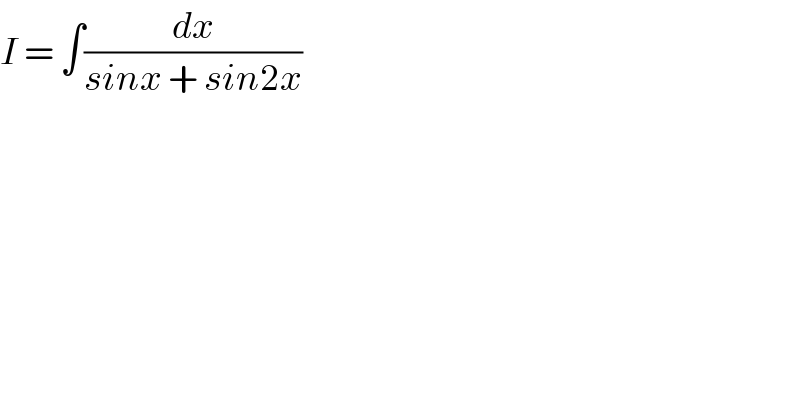
Question and Answers Forum
Question Number 6444 by sanusihammed last updated on 27/Jun/16

Commented by Temp last updated on 27/Jun/16

Answered by Yozzii last updated on 27/Jun/16
![I=∫(dx/(sinx+sin2x))=∫(dx/(sinx(1+2cosx))) Let u=tan0.5x⇒(2/(1+u^2 ))du=dx sinx=((2u)/(1+u^2 )) and cosx=((1−u^2 )/(1+u^2 )). ∴I=∫((2/(1+u^2 ))/(((2u)/(1+u^2 ))(1+((2(1−u^2 ))/(1+u^2 )))))du I=∫(((1+u^2 ))/(u(1+u^2 +2−2u^2 )))du I=∫((1+u^2 )/(u(3−u^2 )))du I=−∫((1+u^2 )/(u(u−(√3))(u+(√3))))du Let ((1+u^2 )/(u(u−(√3))(u+(√3))))≡(a/u)+(b/(u−(√3)))+(c/(u+(√3))) ≡((a(u^2 −3)+bu(u+(√3))+cu(u−(√3)))/(u(u+(√3))(u−(√3)))) ∴1+u^2 =a(u^2 −3)+bu(u+(√3))+cu(u−(√3)) Let u=0∴ 1=a(−3)⇒a=((−1)/3). Let u=(√3)⇒4=b(√3)(2(√3)) 4=6b⇒b=(2/3) Let u=−(√3)⇒4=c(−(√3))(−2(√3)) c=(2/3). ∴ I=−∫{(2/3)((1/(u+(√3)))+(1/(u−(√3))))−(1/(3u))}du I=−(1/3)∫{2((1/(u+(√3)))+(1/(u−(√3))))−(1/u)}du I=((−1)/3)[2ln∣(u+(√3))(u−(√3))∣−ln∣u∣]+C I=((−1)/3)ln∣(((u^2 −3)^2 )/u)∣+C I=(1/3)ln∣(u/((u^2 −3)^2 ))∣+C I=(1/3)ln∣((tan0.5x)/((tan^2 0.5x−3)^2 ))∣+C](Q6450.png)
Commented by nburiburu last updated on 27/Jun/16

Commented by sanusihammed last updated on 27/Jun/16

